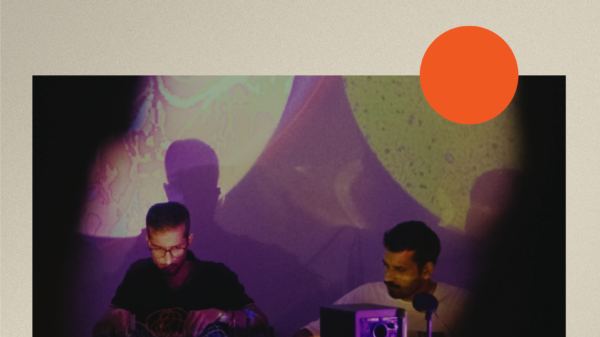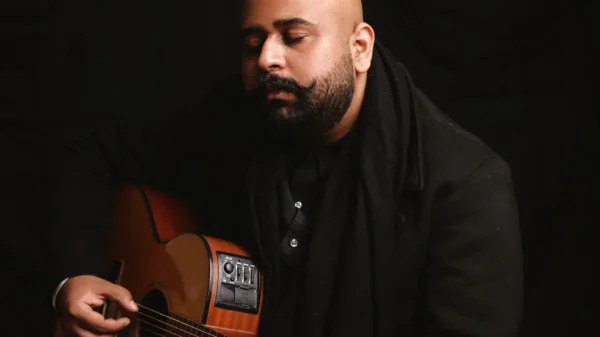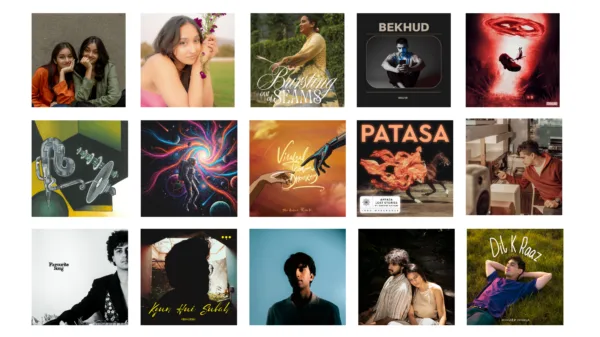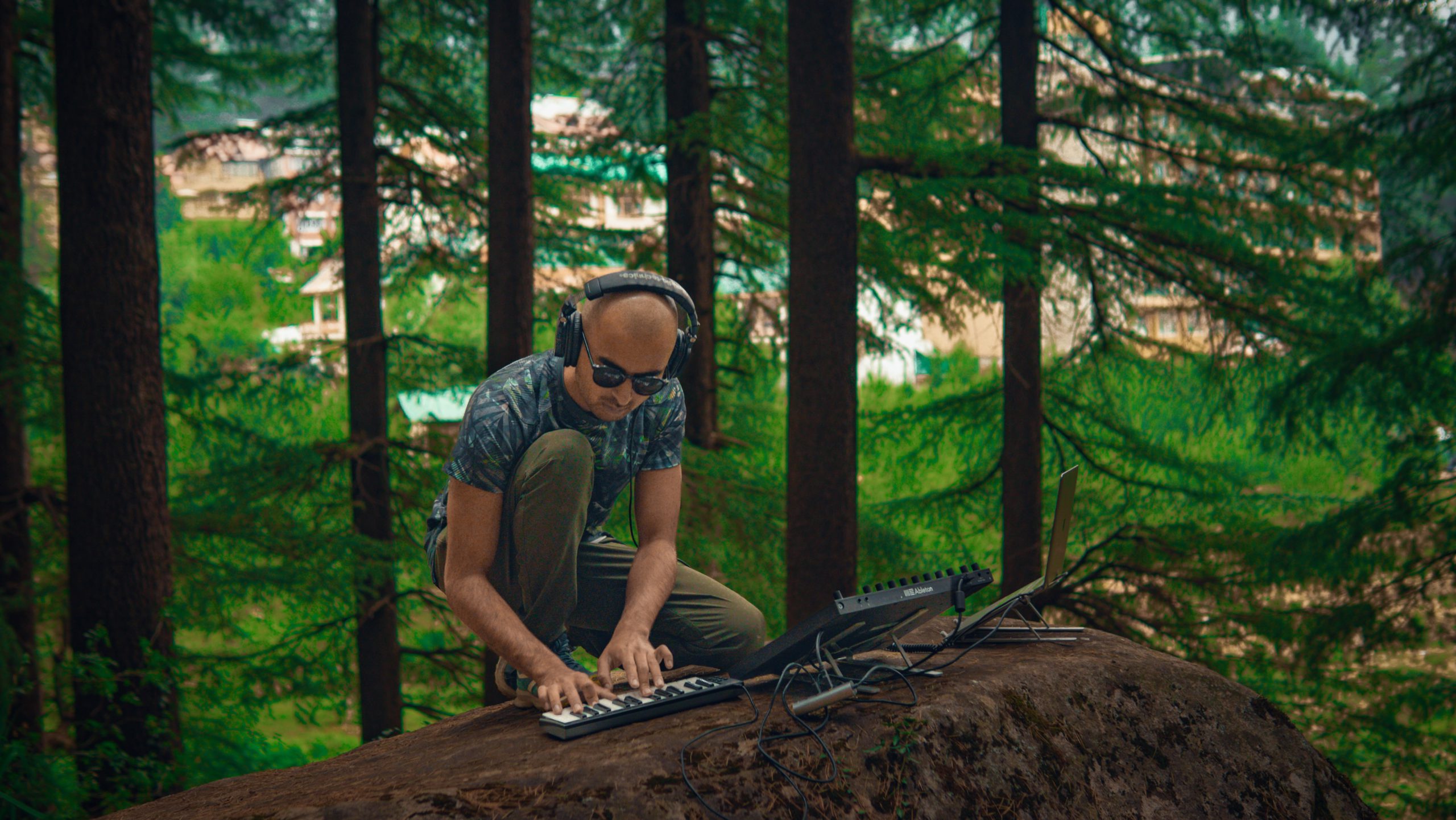There are times when a new artist comes about and change the way we think about music and its production. This year, one of them was Diveakssh Schae or Divi, who released an album that was created using sounds from around the world, particularly in Australia and India. He produced the whole album using his camper van ‘Spoons’ and backpack ‘Mukti’ with the world as his instrument. Previously working in the field of DJ and sound design, he discovered cymatics and fell in love with the connection between nature, sounds, and vibrations. The ‘audio nomad’ left his city on a spiritual journey to unlock the music stuck inside of him.
In today’s day and age, technology enables musicians to create music anywhere. Divi’s album ‘Moments of Clarity’ showcases exactly that. Released last month, the cinematic electronica album explores music as a very spiritual, awakening experience while also exploring worldly themes like childhood nostalgia, friendship, faith, the rise of AI and its impact on relationships, heartbreak, and the pandemic. The artist, back in 2021 hopped into his camper van and composed 6 stories in Queensland, Australia and Lake Tinaroo. In 2022, he came back to his roots in India and produced more tracks in places like Himachal Pradesh, Ladakh, Auroville and Kodaikanal. ‘Moments of clarity’ is also a personal expression of his past experiences.
We had a very interesting chat with the artist and this is what he had to say:
What made you decide to travel and record an album in a camper and a backpack? What was the inspiration?
I was raised in the jungles of Dandeli in South India. My inner Mowgli found the idea of creating music while reconnecting with nature very appealing.
After 5 years of working a job in Australia which had nothing to do with music – I started to get disillusioned. I returned home to India, and one day had a ‘moment of clarity’; it felt like the music I had been suppressing just couldn’t wait any longer. I asked myself “if I can do anything in this life – what would it be?” In that moment, I decided to leave what I knew behind to chase my love for music production.
The initial plan was to move to LA to study at Beat Lab Academy. However, the pandemic blocked that from happening. Instead, a series of events led me to discovering van life. I realised I could learn & create against a backdrop of everywhere. When I returned to India with the bones of the album, I wanted to continue this nomadic lifestyle. Scaling my music studio down to fit into a backpack allowed me to polish the album while exploring my home country.

You chose very interesting names for your album, camper van, and backpack. Can you elaborate on that?
I love to name things. I find it gives them character and personifies them. That way, I take better care of them and they become a part of my nomadic journey.
The album’s title, ‘Moments of Clarity,’ came to me in a lucid dream. It felt like an apt way to describe the awakening which kickstarted my entire journey. I had other similar moments following this awakening – so the name stuck.
I bought my campervan Spoons from my nomadic friend Andy. When asked “why Spoons?”, he said “you end up helping people around you when you’re on the road.” He used the metaphor of “giving them spoons if they run out.” This resonated with my journey as I hit the road, collaborated with other musicians, and made incredible friendships. He also told me that no matter what – “you should always keep a spoon for yourself.” That resonated with my needing solitude to go inward and nurture my own
mental health. I never truly felt alone in the wild because I always had Spoons. So the name stuck!
My backpack Mukti means freedom in Hindi. Downsizing my belongings and living a minimal lifestyle gives me the freedom to be an audio nomad. It’s also a nod to the town of Mukteshwar – which is where I began my solo travels through India.
What went into your backpack and the van, equipment-wise?
Back in the day, you couldn’t create professional-sounding music unless you booked time in an expensive music studio. Today – we don’t need much to create it.
In Australia, I kitted out my campervan Spoons with a solar panel & battery so I could generate my own electricity. This powered my music studio, which contained my:
- Macbook Pro Laptop – my main instrument
- Audiotechnica m50x headphones
- A Casio CT keyboard – which has a MIDI connection for production, but also has batteries so you can take a break from the screen and play by the lake
- 2 Rode NT-USB Vocal Microphone’s – great for vocals, but also to record pianists I met on the road like Esther Koehler (featured on two tracks on the album)
- Focusrite Soundcard – so I could record guitarists I met along the way such as Asher Reuven (also played on most of the tracks in the album)
- Zoom H4n field recorder – which allowed me to portably sample sounds of my van, nature, and ambience
- Traktor S4 & a big bluetooth speaker named Bruce – so I could DJ at hostels or with friends I made along the way (shoutout to my Germans!)
In 2022, I sold Spoons and returned to India. I needed to transition my studio to fit into a backpack. I had also acquired an Ableton Push 2 (named Pushpa ). Mukti, my 55-litre Osprey backpack was just the right size to fit Pushpa. I stripped back my other equipment to the bare essentials I needed to make music nomadically. For example, I swapped my big keyboard for the world’s smallest – the Nektar SE25.
My backpack is 70% music gear, 20% clothes, and 10% everything else. I went to Decathlon & bought a handful of clothes that could roll up into nothing. I have lived out of these for the last year. Minimalism enables nomadism.


There are some rhythm patterns (like the sound of the train mixed with the tabla) and vocals that can be seen throughout the album. Do those patterns represent Diveakssh?
I’ll talk about the train beat specifically. I spent a lot of my childhood taking the train from Dandeli to Bombay or Bangalore. So when I was kitting out my campervan, inspired by the beds on the Indian train, I installed a folding bed in my van Spoons.
As I heard the clinking of the chains that held up my bed, and fell asleep under the stars in the middle of the Australian wilderness – I felt connected to that boy on the Indian train.
When I started composing the music – the sound of the train beat kept coming to me. I recreated it by tapping on the steering wheel of my van, and using my skills on Ableton to morph it into the beat in my head.
This train beat is on every track in my album. ‘Moments of Clarity’ is a train ride through my identity, awakening, and the events that surrounded it.
What were some of the challenges you faced while trying to make ‘Moments of Clarity’ as professional as possible?
On the road, you have to work with what you have. The result is ‘Moments of Clarity,’ an album that has a unique sound.
Esther Koehler is a talented German pianist who collaborated with me to create two piano versions of my tracks. However, in terms of microphones – I only had the two Rode mics that are designed for vocals. As for locations – we recorded ‘Stare’ in a pizzeria in Australia, and ‘For Sam’ in a living room in India. These mics & spaces are far from the ideal studio environment, but they carry the sounds of the spaces they were recorded in.
Mixing & mastering was another challenge, as it’s a technical process you need to do to make your music pop. Initially, this seemed overwhelming as I didn’t know how to do it. The internet is also full of myths that you need to have studio monitor speakers and a treated room to do this right. I learnt that you can get pretty close if you know your headphones well enough. Like anything else – I completed an online course to learn the necessary skills and give my music the finish it needed with the equipment I had.
I continue to be amazed that we live in a world where we can learn anything – wherever and whenever we want.
Who was Diveakssh Schae before his moment of clarity? What is his background as a musician?
I’m not a trained musician by any means. In fact, when people ask me what instrument I play, I answer “the computer.” I fell in love with sound when I discovered electronic music in boarding school in Kodaikanal, India. I spent years experimenting with DJ software to create sounds I had never heard before and to listen deeply.
This grew into learning how to use Ableton to design original sound for film & theatre projects in Australia.
However, I only fully understood my love for sound when I discovered cymatics – the science of visualising sound. I realised that the blueprints of nature’s very designs are stored in the secrets of vibration. I put on my first live experience in 2015 by inviting an audience to interact with cymatics.
Then, I worked a job for 5 years with a big brand. I launched & ran their official podcast, which made me realise the power of the human voice.
My album is the product of all of these experiences.


What are some of the most bizarre sounds that you used in the album?
Haha, I love this question because there’s so many!
Most of the drums in my album are from the sounds of my 34-year old van, Spoons. I sampled it all – slammed her doors, tapped rhythms on her steering wheel and pulled the bungee cords that held my home together. This is why she’s the hero of the album, and is featured on the album art.
Another sound that I love is the Australian pedestrian crossing. Its rhythmic beeps always trigger a rave in my head. Hearing it always takes me back to my second home in Australia.
Perhaps my most favourite is the sound of a phone vibrating against a table which is the bassline in Stare – a song about phone addiction. I love using sounds in my tracks that belong to its story.
Since this whole process was very spiritual for you, what were some of your realisations about music?
I’ve always had an intuitive sense that sound is what holds this world together. From creating the rings on the bark of a tree, to informing the various shapes & colours in nature’s creations.
This intuition has solidified as I spent time in solitude observing nature while reading books such as Cosmometry by Marshall Leferts.
Music is simply organised sound. Any frequency multiplied by two is an octave. Take equidistant points in between that, and you have a scale. Play those in any order, and you have melody. Play any of them at the same time, and you have harmony. Repeat any sound in a pattern, and you have rhythm.
When you understand the physics of music, you realise it’s the universe having fun with its most primitive medium: sound.
What are some of the most interesting incidents you experienced in your life as an audio nomad for these two years?
I’ll pick one from India and one from Australia.
In Naggar, Himachal Pradesh – music exists through everyday life. Two days a week, the garbage truck would go through town. Rather than signalling its presence by yelling or beeping like they do in other parts of India, they blast a full-fledged song on speakers. It goes “gaadi waala aaya ghar se kachra nikal (the car guy is here, get your trash out of the house).”The best part is how no one in the town bats an eyelid, they simply walk out and tip their trash for collection. Being an audio nomad, I absolutely had to record it. I hope to do something with it in the future!
In Australia – I was able to record the experience of meeting Charlie, who features on the third track in my album. Charlie is an indigenous Elder of his tribe. I met him at a campsite, where he invited me to listen to him playing the Didgeridoo – an ancient Aboriginal instrument. He taught me that their tribes have been sharing stories through sound for generations. Through this experience, I stopped trying to write tracks, and instead started telling stories through my music.
You have touched on themes such as the social dilemma and the takeover of AI, the pandemic and the story of sounds in this album. Do you think it is something that needs to be talked about a lot more, especially through music?
I don’t have a strong opinion on certain topics that need to be discussed more through music. Rather, I realised that the best way to unlock the music inside me was to seek inspiration from within. The themes you hear in my album are derived from true and personal stories from my life.
“Stare” is a song about phone addiction. As we get more obsessed with capturing moments, we sometimes forget to truly live them. For me, I experienced this disconnect from a shared sense of reality in a relationship. The track has voiceovers inspired by the documentary “Social Dilemma,” sounds of phone notifications and a robot voice inspired by Daft Punk.
“Blessings in Disguise” is about how problems I faced when leaving my world behind to chase music actually dissolved into solutions. One example is how the pandemic blocking my plans to move to the U.S instead gave way to van-life. So again, it has voice overs that tell parts of this story.
Diveakssh Schae has undoubtedly brought something interesting and unique to the indie music scene. Let’s see what he creates in the future!



























